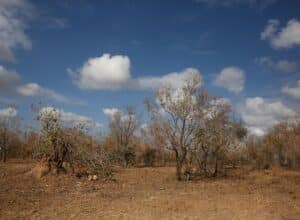Zambia’s Climate Crisis: A Severe Drought Takes its Toll on Lives, Economies, and Mental Health
Climate change is causing severe droughts in many parts of the world. Zambia is facing the worst drought in decades, causing widespread crop failures and crippling the country’s infrastructure, which relies on hydroelectric power. Many people are now facing starvation and hunger as well as severe economic hardship, as farmers and agricultural businesses lose significant income and profits.
95% of the country’s power comes from hydroelectricity leading to prolonged blackouts that frequently last 17 hours a day, exacerbating the challenges faced by an already struggling economy and infrastructure damaged by severe flooding that led to the worst cholera outbreak in decades less than a year ago.
 Without electricity, essential services such as hospitals and food shops are at risk and water pumps stop working, leaving people with limited access to water and basic sanitation. ATMs and traffic lights go offline, businesses struggle to operate in the dark, and precious food storages spoil as refrigerators become unusable after extended daily power outages.
Without electricity, essential services such as hospitals and food shops are at risk and water pumps stop working, leaving people with limited access to water and basic sanitation. ATMs and traffic lights go offline, businesses struggle to operate in the dark, and precious food storages spoil as refrigerators become unusable after extended daily power outages.
The cascading effects of these environmental and economic crises can have a profound impact on mental health, triggering widespread depression. When people are faced with constant uncertainty about their basic needs—such as food, water, and electricity—the chronic stress can become overwhelming. The strain on livelihoods, coupled with the inability to plan for the future, leaves many feeling powerless and emotionally depleted.
Lirato’s Story: Navigating Adolescence Amidst a Climate Crisis
For Lirato, a 14-year-old girl in the Ngombe community of Lusaka, the drought has affected every facet of her life. Her parents’ once thriving farm is now littered with brittle stalks of dead crops and the well near their home no longer fulfills their daily needs. Lirato’s family lost not only their harvest but also their only source of income as her father’s workplace temporarily closed months ago due to a lack of electricity. It has yet to reopen. After months of no income, no crops, and rising food and water prices, Lirato’s family faces food scarcity every day and they now mostly live on watery porridge.
Without electricity, Lirato can no longer study and her school performance has suffered, along with her concentration—with water in such short supply, baths are limited, and she says her skin feels constantly itchy, dry, and dirty. She shares that her dreams of graduating have begun to fade.
When the compounding stressors of the drought left Lirato feeling hopeless and disconnected from the world, she joined a StrongMinds therapy group in her school to address her depressive symptoms. Through therapy, she found comfort in connecting with other students who faced similar challenges in the wake of the drought. She learned valuable skills to cope with the sudden change in her life and worked to normalize her feelings. While the drought continues, Lirato is working to adapt to her circumstances, and move her life forward in spite of her challenges.
Peter’s Story: Battling Depression in the Wake of Economic Uncertainty
Peter, a young man living in Lusaka, lost his job due to the frequent power cuts. Without a steady paycheck, Peter struggled to support his family, causing him to spiral into depression. Therapy offers individuals like Peter the crucial community support they need to feel less isolated and empowered to find ways to survive in the face of adversity.
The devastating impact of the drought highlights the broader climate crisis facing millions of people globally. In Africa, communities are particularly vulnerable. Therapy and community support play a vital role in helping people build resilience to climate-related issues and catastrophes, providing them with the tools and emotional strength needed to navigate and overcome these unprecedented challenges.
